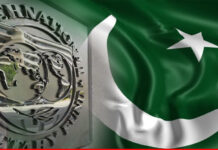
ISLAMABAD: As Pakistan seeks another bailout program from the International Monitory Fund (IMF), the statement of United States’ Secretary of State Mike Pompeo warning IMF against bailing out Pakistan’s loans from China has alarmed Pakistan.
Economists termed the statement unnecessary, however, they suggested the government to take it seriously.
U.S. Secretary of State Mike Pompeo, in an interview with CNBC television on July 30, has warned against providing IMF bailout for Pakistan’s new government that includes funding to pay off Chinese lenders. He said the US looked forward to engagement with the government of Pakistan’s expected new prime minister, Imran Khan, but said there is “no rationale” for a bailout that pays off Chinese loans to Pakistan.
Reacting to the statement a renowned economist, who preferred anonymity, said since the US has an influence in IMF affairs the statement has signalled that Pakistan’s new government, which is severely in need of a bailout, might run into further financial troubles after taking the oath.
“Though there is no doubt that the bailout package is required to meet the balance of payment, mainly emerged for a sharp increase in imports and borrowings, the statement seems to be more in political nature. It has been indicated through the statement that for a bailout program American’s approval is needed,” he said adding the foreign country knows the financial position of the country.
“Keeping in view the US mode, the new government should also look for alternatives like China, Saudi Arabia and others to meet the immediate needs of the economy. Pakistan will require over a $12 billion bailout program to be sustainable under the present deficits. It may be very difficult for the country to make an arrangement of the required loan in case it avoids IMF,” he added.
A former secretary finance, while reacting to the statement, however, said “it was unnecessary to make such remarks since the IMF amount is usually parked at the central bank as an adjuster to support reserves. Even rupee equivalent to the bailout amount is also not issued in the market.”
“A country should not be making an open statement against the international policy of IMF. If the fund is satisfied with the performance of Pakistan, as the country has never defaulted in repayment of loans, the US or any other country should not be concerned about any future program,” he said. “The State Secretary e has not indicated to oppose the bailout program but hinted making it conditional,” he claimed.
According to insiders at the ministry of finance, the IMF must give its reaction to the statement of US state secretary. The US, by interfering in IMF’s affairs, probably wants Pakistan to meet its demands, unknown so far. It’s now up to the next government whether it will surrender to what the foreign country demands or search for alternative lenders, a difficult option indeed.
Pakistan has already been given a red signal by the US during the recent meetings of Financial Action Task Force (on Money Laundering) (FATF) indicating that the foreign country may not extend its support for Pakistan in such forums. “After the Mike Pompeo’s remarks, it seems, it will be very difficult for Pakistan to avail the program on better terms,” said sources at the ministry.
According to Dr Viqar Ahmed of SDPI, the IMF, for the next bailout plan, may demand Pakistan to devalue rupee further, increase electricity/gas tariff, privatize state-owned enterprises like DISCOs, cut expenditure etc.
He said the country this time needed major bailout program of over $12 billion as compared to the previous program of the Fund. Pakistan will be making $6 billion repayments of loans by December 2018.
All indicators suggest the Pakistan Tehreek-e-Insaf’s government, which is likely to take the oath by mid of August, will immediately have to approach the IMF for what would be the country’s 13th bailout from the fund.
Through OBOR’s flagship project China Pakistan Economic Corridor (CPEC), Pakistan has taken numerous loans from its trading partner China, which economists have warned the country may face difficulty in paying back.





